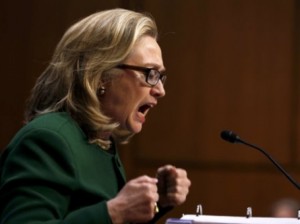by Chris Cillizza • Washington Post
 On Tuesday night, the Post reported that the FBI was looking into the security precautions that then Secretary of State Hillary Clinton took with her private e-mail server as well as a thumb drive in the possession of Clinton’s lawyer that holds e-mails she sent while the nation’s top diplomat.
On Tuesday night, the Post reported that the FBI was looking into the security precautions that then Secretary of State Hillary Clinton took with her private e-mail server as well as a thumb drive in the possession of Clinton’s lawyer that holds e-mails she sent while the nation’s top diplomat.
Now, to be clear, there is NO investigation. There is NO allegation of wrongdoing. Clinton is the target of NO probe.
Which, legally speaking, is good news for Clinton. Politically speaking, though, this is yet another bad story for the Democratic presidential frontrunner and provides the latest evidence that the e-mail story just won’t go away.
Here’s why.
Remember that the average voter isn’t keeping track of every in and out of this story. They probably have some idea that Clinton had her own private e-mail address and server that she used exclusively during her time at the State Department. They may know that this wasn’t standard operating procedure.
And, that’s about it. So, when they hear (or see) “FBI” and “Clinton e-mails” in the same headline, it’s unlikely that they deeply engage in the fact that this isn’t an investigation or that Clinton isn’t a target. Instead, it likely adds to a sort of general unease they have about the whole process and how Clinton has explained her decision to use only a private e-mail address. It adds to the “where there’s smoke, there’s fire” argument that Republicans have been pushing on a variety of Clinton-related topics — the Clinton Foundation, for one — since it became clear she was going to run in 2016.
Now, the smoke-must-equal-fire argument doesn’t hold water in a court of law. But in the court of public opinion? Different story. Witness Harry Reid’s false claim during the 2012 campaign that Mitt Romney hadn’t paid any taxes at all during the past decade. That allegation, which turned out to be totally wrong, helped shape the image of Romney as an entitled plutocrat who thought the rules didn’t apply to him. (Romney didn’t exactly do himself any favors in fighting that image either.)
There’s more to the e-mail issue than the perception problem too. As WaPo’s Carol Leonnig, Roz Helderman and Tom Hamburger reported last night:
The inquiries are bringing to light new information about Clinton’s use of the system and the lengths to which she went to install a private channel of communication outside government control — a setup that has emerged as a major issue in her campaign for the Democratic presidential nomination.
For instance, the server installed in her Chappaqua, N.Y., home as she was preparing to take office as secretary of state was originally used by her first campaign for the presidency, in 2008, according to two people briefed on the setup. A staffer who was on the payroll of her political action committee set it up in her home, replacing a server that Clinton’s husband, former president Bill Clinton, had been using in the house.
Nothing in those two paragraphs is damning. But, the fact that Clinton used a server left over from her 2008 campaign and that someone on her PAC payroll set it up isn’t exactly confidence-inspiring when it comes to concerns about how airtight the security on it was. The more attention how Clinton handled the e-mail server gets, the more small details like those will come to light. And the easier it will be for Republicans to make the case that Clinton may have played fast and loose with critical information.
And, finally, there is this fact: there are 31,380 e-mails that Clinton sent from the private server in question that we will never get a look at. That’s the number of e-mails that Clinton said she deleted because they were of a purely personal nature.
The process by which she made that deletion decision remains fuzzy; it’s not clear, for instance, whether anyone ever read all 62,000 of the e-mails she sent on her private address before deleting more than half of them. All we really know is that people being paid by Clinton reviewed — whether individually or through a series of filtered searches — all of her e-mails and made a decision that more than 30,000 of them were purely personal.
That’s a tough pill to swallow. The public, of course, doesn’t know it will be asked to swallow that pill. But, Republicans will make sure they are well aware of that fact before November 8, 2016.
The e-mail story continues to linger in Clinton’s political orbit. At times, it drifts almost out of sight but then spins back into plain view. It won’t go away — certainly not before 2016 — so she has to find some way to co-exist with it. She hasn’t yet.
Chris Cillizza writes “The Fix,” a politics blog for the Washington Post. He also covers the White House.